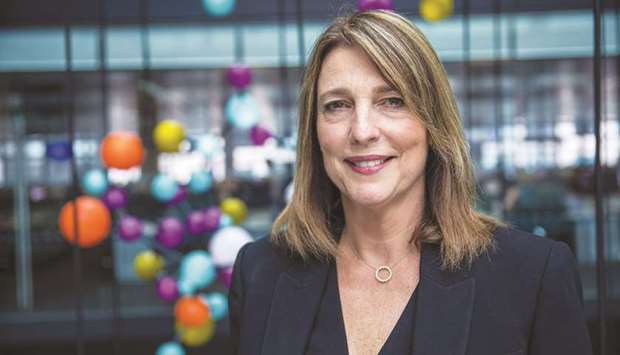Advertisers from food to finance to cosmetics, squeezed by Brexit and a slowing UK economy, are busy shifting television ad dollars to Facebook and YouTube as they reassess marketing budgets. Viewers, meanwhile, are tuning in to Netflix and Amazon Prime. TV advertising is forecast to drop 2.7% in the UK this year, according to GroupM. The last decline was in 2012.
ITV is counting on 55-year-old McCall, who is leaving her job as the CEO of EasyJet just as Brexit threatens the access of UK airlines to Europe, to come up with the answers and return a struggling business to revenue growth. The UK’s largest free-to-air commercial broadcaster passed over a “very impressive field of high-calibre candidates,” to select McCall, according to chairman Peter Bazalgette. Her experience atop Guardian Media, which owns The Guardian and The Observer newspapers, makes her well suited to tackling the challenges, said Alex DeGroote, an analyst at Cenkos Securities.
“She’s got a good grip on the key issues facing traditional media,” DeGroote said by phone. “She’s got very relevant sector experience.”
ITV advanced as much as 3.8% in London, the most in more than three months. The shares were up 1.6% to 177.90 pence at 1:47pm EasyJet rose 0.9% to 1,424 pence.
At ITV, McCall will also be running a company that is a perennial subject of takeover speculation. Billionaire John Malone’s Liberty Global owns about 9.9% and has been tipped as one of several potential bidders, speculation that has intensified following Britain’s vote last year to leave the European Union.
Arresting a recent decline in ad sales, improving the quality of ITV’s online video offering and warding off the challenge from international streaming services like Netflix will be McCall’s top priorities, and a “monumental” task, said Neil Campling, an analyst at Northern Trust Capital Markets in London.
McCall, who is one of the few female chiefs in aviation, will become the first woman to lead the broadcaster when she starts on January 8. She is to join a company that has less revenue than EasyJet yet is more highly valued in the stock market. ITV had £3bn ($3.9bn) of revenue last year and has a market capitalization of £7bn, while EasyJet’s sales were £4.7bn and its value is £5.6bn.
Outgoing ITV CEO Adam Crozier has been cutting jobs and slimming costs as it faces declines in advertising sales with retailers wary over the short-term outlook for Brexit and rising inflation. He has also built up its ITV Studios production arm to reduce its reliance on advertising. Ad sales made up 47% of ITV’s overall revenue in 2016, compared with 64% in 2010, the year Crozier joined. ITV’s shares have almost tripled since Crozier became CEO.
While McCall lacks production experience, ITV, which makes Coronation Street and I’m a Celebrity ... Get Me Out of Here! is stocked with people including Bazalgette who know how to make TV shows, according to DeGroote.
The broadcaster will pay McCall an annual salary of £900,000 and a pension allowance of 15% of her pay. She will be eligible for a bonus of as much as 180% of salary and a long-term incentive plan of up to 265% of her salary. The package provides “broadly the same remuneration opportunity” as Crozier had, ITV said. McCall also will receive payment to compensate her for money she will forfeit when she leaves EasyJet, ITV said.
“We view this appointment as positive,” Tamsin Garrity, an analyst at Jefferies, said in a note to clients. “McCall has understanding of the commercial side of the business.”
At EasyJet, McCall has shifted away from a bargain-basement model and focused on attracting family groups, more affluent couples and price-conscious business travellers. That’s meant adopting flexible ticketing options and adding flights at major airports — something that low-cost No 1 Ryanair Holdings has followed. More recently EasyJet has struggled with the impact of Britain’s vote to exit the EU, the collapse of oil prices and a string of terror attacks which has driven a slump in fares.
The next EasyJet CEO must “increase focus on cost management and possible restructuring,” Daniel Roeska and Caius Slater, analysts for Sanford C. Bernstein, said on Sunday in a note to investors. “Bringing in an external candidate, given the required qualifications, with fewer ties to the organisation and a fresh view, may be beneficial for shareholders.”
A search for a successor has already begun, the Luton, England-based airline said in a statement yesterday.
EasyJet shares are down 8% since the Brexit vote in June 2016 after having lost about a third of their value after the referendum.
Last year, McCall was linked to a possible move to become the boss at London-based retailer Marks & Spencer Group.
“After seven years, the opportunity from ITV felt like the right one to take,” McCall said in the EasyJet statement. “It is a fantastic company in a dynamic and stimulating sector. EasyJet is a structural winner in a brilliant position, and I look forward to being a loyal customer in the years to come.”

